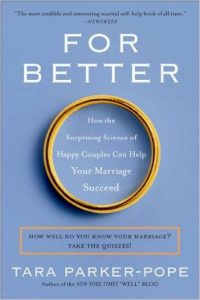For Better: How the Surprising Science of Happy Couples Can Help Your Marriage Succeed
by Tara Parker-Pope
 Marriages are complex and it is often difficult to know the best way to enable them to flourish. In For Better, Tara Parker-Pope shares valuable insights gained from social science that can help create happy, healthy, lasting marriages. She breaks the data down for the average person to understand, and shares personal anecdotes so it is not dry. The insights in this book can enable couples to support their marriage more effectively.
Marriages are complex and it is often difficult to know the best way to enable them to flourish. In For Better, Tara Parker-Pope shares valuable insights gained from social science that can help create happy, healthy, lasting marriages. She breaks the data down for the average person to understand, and shares personal anecdotes so it is not dry. The insights in this book can enable couples to support their marriage more effectively.
Parker-Pope’s book is a tool not only to enrich marriages, but also to identify areas of risk and to diagnose and mend problems. Certain sections, for example, are pertinent for those who are dating and discerning if a particular relationship is right for marriage. The chapter on “Flirting, Attraction and Chemical Passion” in particular may be helpful to single people.
I found this book to be extremely interesting and well-written. I was a psychology major, so I love how this book is full of scientific data rather than conjecture or someone’s personal musings. Any suggestions in this book are tried and researched. There are also helpful quizzes to help people evaluate their marriage and their personal attitudes in various ways.
Given the many misconceptions about how prevalent divorce is, I found the first chapter, “Sizing Up Modern Marriage,” to be illuminating. Parker-Pope writes, “People married in the 1980’s and 1990’s are getting divorced at lower rates than their counterparts in the 1970’s. In fact, marital stability appears to be improving each decade” (12). It was significant to see that couples married after the age of 25 have a much lower risk for divorce (11).
Additionally, I found the chapter on conflict to be enlightening. As Parker-Pope explains, it’s important to “fight well” – to handle disagreements in a constructive, respectful way. Either too much or too little conflict can be a problem. They key is to handle conflict well. The book gives helpful tips to help de-escalate arguments. Parker-Pope also warns several times of the danger of showing contempt towards one’s spouse.
In the last section of the book, she addresses issues related to division of housework, navigation of finances, and work-life balance. These are complex issues that all couples face and these chapters may help some to better understand these areas in their marriage.
By the time the reader gets to the final chapter, “The Science of a Good Marriage,” most of the information is no longer new, but more of a summary of the findings. Parker-Pope lists the “seven strategies that studies show successful couples use to stay happy and bolster the strength of their marriage” (271). These are definitely worth jotting down as a “cheat sheet” to remind yourself. Tape them on your mirror if needed!
In a brief area of concern, Parker-Pope makes reference to birth control in which she implies that it is empowering for women (19). Later on, however, she notes that the effects of the pill “blunt our natural instincts” about selecting “genetically dissimilar partners” (54).
Overall this was an excellent read. While For Better is not written from a Catholic perspective, it can offer many insights to anyone looking to build or maintain a happy, healthy marriage. It is practical, encouraging, and relatable.
About the Reviewer
Since 2013, Rebecca Baehrend has worked in the Secretariat of Laity, Marriage, Family Life and Youth at the United States Conference of Catholic Bishops. She studied in Rome, Italy where she earned her Master in Marriage and Family Science from the central session of the John Paul II Institute for Marriage and Family Studies. She loves going to concerts, swimming and drinking tea.
Disclaimer: Book reviews do not imply and are not to be used as official endorsement by the USCCB of the work or those associated with the work. Book reviews are solely intended as a resource regarding publications that might be of interest to For Your Marriage visitors.




